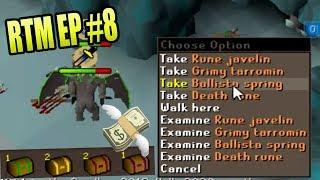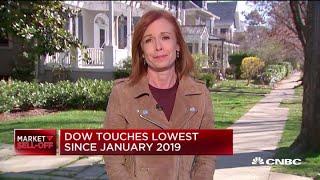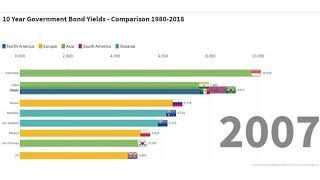Jim Cramer: Bond yields are falling and that could stunt bank profits
Description
"Lower long-term rates translate to lower earnings for the banks, which is why they've been coming down so hard," CNBC's Jim Cramer says.
U.S. Treasury yields are sliding, and that could negatively impact financial institutions, CNBC’s Jim Cramer said Monday.
“Worries about a worldwide slowdown mean people will buy [U.S.] Treasurys, and when people buy Treasurys, interest rates go down,” the “Mad Money” host said. “Lower long-term rates translate to lower earnings for the banks, which is why they’ve been coming down so hard.”
Bond yields, or interest rates, move inversely to price. The yields on the benchmark 10-year Treasury note and 30-year Treasury note are both down more than 15 basis points over the past week.
The SPDR S&P Bank ETF has fallen almost 5% over the past five trading days. Shares of Citigroup are down more than $5 and those of JPMorgan Chase are off nearly $7 from where they traded after reporting earnings on Jan. 14.
Fears surrounding the coronavirus, discovered in China and now spreading worldwide, are shaking up global markets. The Dow Jones Industrial Average, S&P 500 and Nasdaq Composite all dropped as much as 1.89% in Monday’s session, as investors fear that the disease could disrupt international commerce and induce an economic slowdown.
Officials in China have quarantined numerous cities in an attempt to halt the spread of the virus.
“Financial technology companies that rely on volume could be cut, but I’m not as worried about these,” Cramer said. “You’d need a lockdown like they have in China to shut down retail, although I can see plenty of people just staying home and, yes, ordering from Amazon.”
In response to the threat, some U.S. companies have decided to suspend their operations in China.
“I also think that the risk of a slowdown based on a decline in expected profits isn’t fully baked in yet if China ends up doing a full shutdown of their economy by telling people to stay away from work or just stay at home,” Cramer said. “That could be very bad for business, even if it might be necessary to stop this virus.”
Though the number of worldwide cases has reached 2,900, the World Health Organization has not declared the coronavirus a global health emergency. In the U.S., five people have been diagnosed with the virus after traveling from China, and U.S. health officials are reportedly monitoring 110 people across the country for the virus.
For access to live and exclusive video from CNBC subscribe to CNBC PRO: https://www.cnbc.com/pro/?__source=youtube
» Subscribe to CNBC TV: https://cnb.cx/SubscribeCNBCtelevision
» Subscribe to CNBC: https://cnb.cx/SubscribeCNBC
» Subscribe to CNBC Classic: https://cnb.cx/SubscribeCNBCclassic
Turn to CNBC TV for the latest stock market news and analysis. From market futures to live price updates CNBC is the leader in business news worldwide.
Connect with CNBC News Online
Get the latest news: http://www.cnbc.com/
Follow CNBC on LinkedIn: https://cnb.cx/LinkedInCNBC
Follow CNBC News on Facebook: https://cnb.cx/LikeCNBC
Follow CNBC News on Twitter: https://cnb.cx/FollowCNBC
Follow CNBC News on Instagram: https://cnb.cx/InstagramCNBC
#CNBC
#CNBC TV





















Comments